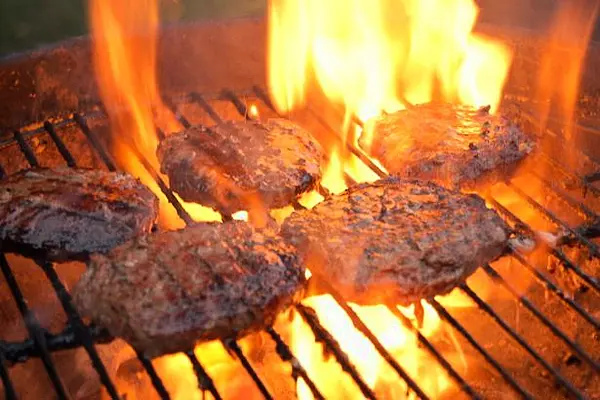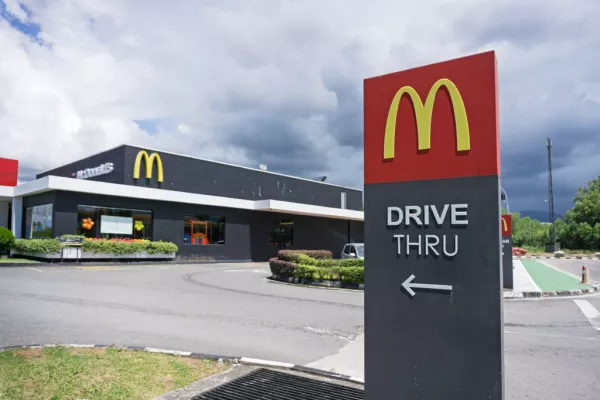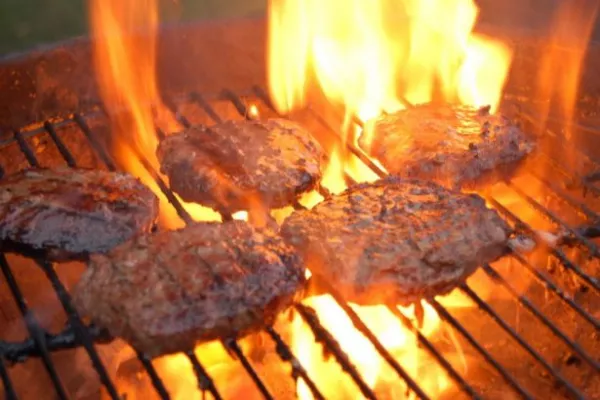"I want to serve a shot of whisky with the burger."
Keith McNally has an unconventional idea for the dish at his about-to-open restaurant Augustine; both are about to get a lot of attention. He’s sitting in Augustine’s dining room, in the Beekman Hotel, across from Tom Colicchio’s Fowler & Wells, and it’s a few hours before the first preview dinner.
The legendary restaurateur—who single-handedly made a French-style bistro the sexiest, most compelling place to dine with Balthazar—is notoriously averse to interviews. He’s often at his restaurants, which also include Cherche Midi in SoHo and Schiller’s on the Lower East Side, but he’s not the guy who stops at every table, inquiring about your meal. For anyone who is a fan of the New York dining scene (100 percent), a chance to talk to McNally in and about his new restaurant is a double score—like getting an interview with George R. R. Martin, so he can talk you through the next season of Game of Thrones.
Augustine, McNally’s first restaurant in two-and-a-half years, will look a little familiar to anyone who has spent time at one of his places. Vast mirrors are embedded in the walls, surrounded by hand-painted ivory tiles. Flower-shaped lights and chandeliers hang above chocolate-brown banquettes with railings. The place evokes many other McNally’s spots while also feeling fancier and more expensive. It is, perhaps not coincidentally, his first place in the Financial District.
It isn’t long before London-born McNally, who looks like Harry Potter a little later in life and pronounces Balthazar as "bal-ta-zar," is talking about the burger he and Augustine chefs Shane McBride and Daniel Parilla (who everyone calls Chino) have devised. McBride is a veteran of Colicchio and Charlie Palmer kitchens; Parilla cooked at Café Boulud and Bouley in New York. It took the chefs, who also worked together at Cherche Midi, a 10-day trip to Europe and almost two years to nail down the menu. Star of the kitchen is a monstrous rotisserie, from which McBride and Parilla produce a succulent duck à l'orange with soy orange butter; leg of lamb with fines herbs and lamb jus; and, of course, chickens.
But a burger at a McNally place is always going to get mega attention. The Black Label served at Minetta Tavern, a dry-aged patty drizzled with butter and topped with caramelized onions, is worshipped by burger fanatics. McNally, McBride, and Parilla think the one they’re introducing at Augustine is just as good. (I think it's better.)
I got to try the first official Whisky Burger that came off the griddle, named so because the onions that top it are doused with Scotch as they’re sautéed. The potato and onion bun is an exclusive from Balthazar Bakery. Its meaty, extremely juicy brisket blend has a nice crust from the flattop. Parilla puts the booze-infused onions right on top of the patty and then nutty Comté slices on top of that and slides it under the salamandar so the onion flavors soak into the patty and the melted cheese holds it all down.
Asked about how many burgers Parilla has made during his seven-year tenure at McNally restaurants, he laughed out loud. “About 25,000,” he estimated after a few seconds thought.
I got to have a rare sit down with McNally, a few hours before his first preview meal was about to start. He has a cheeky, dry sense of humor and likes to joke about a range of topics, from his new Wall Street neighborhood (he laments there are not transvestites there) to the return of Pastis, but there's one he's serious about—how hard it has become to turn a buck in New York's restaurant world.
On the Beginning of Augustine“My friend André Balazs was about to take the 5 Beekman building and asked me to look at it. I thought it was sensational. For whatever reason, André lost it. I thought I’d never see it again. Then the new owners found me.
I got into the space two years ago, but I started working on it three years ago. The first thing I thought about was those kinds of Art Nouveau tiles, framing the mirrors. A rather turn-of-the-[20th]-century-looking place. Not because I’m so old and would remember that period, but I lived in France for a while, and I respond to that kind of French look. I found a place in Italy that could produce them and had a number of old tiles, too. That process of designing them, and looking at them and being unhappy with them and then being happy after they were remade, took about two and a half years. That was the element that took the longest time. But maybe it’s worth it.”
On the Similarities Among McNally Restaurants
“I think all my restaurants are a little bit different, but it’s like twins. People will say, 'It’s a bit like Minetta Tavern or Balthazar.' And there are elements, of course, that are similar. But to me it’s a very different place.
In the end I don’t want to do something that’s vastly different. I’m quite selfish in that way. I only marry women I want to marry. I only build restaurants that I want to go to. That’s all it is.”
On His New FiDi Hood
“I always like going into new neighborhoods. When I was first in the Meatpacking District with Pastis, it was really exciting. It was quite barren and raw. There were a lot of hookers and transvestites and an element of danger that I like. It’s not there now, and it certainly isn’t in the Financial District. Augustine might be a place that will bring people down from other parts of town who don’t come here now. Maybe I can rediscover those people I used to see in the late '90s at Pastis.”
On that Burger-Shot Combo"Shane and Chino and every one of my staff say it’s a really bad idea. So we're not doing it," he laments. Although nobody is going to stop you from cobbling it together yourself. Then he adds, jokingly (I think): "I’ve got a fantasy for a menu: Making a children’s menu with no burgers or pasta. Instead it would be all really fine dining, very French, à la carte, intricate. And then adults get the menu with the burgers and the pasta. I’m quite perverse. But actually it’s the way adults eat these days, so maybe I’m right.”
On Rebuilding Pastis
“In the past I’ve said my latest restaurant is my last one. I’m not going to say it now because I know that I’m rebuilding Pastis. It closed about three years ago, unfortunately. The business was terrific. My lease came to an end. When you go into a new neighborhood and become successful, you’re shooting yourself in the foot, because you’re creating big rent for yourself at the end of your lease—the landlord raised the lease about 15 times.
"But I’m rebuilding it around the corner on Gansevoort Street. I'll start in March. I hope it will work, but it might be a bit like calling up an old girlfriend when you’re in the neighborhood like 15 years after you’ve last seen her. Reopening in the same neighborhood all these years later might be embarrassing. But it won’t be exactly the same. I’d like the food to be different—lighter with a lot more grilled fish, and slightly more Californian."
On Opening in Brooklyn and the Problems With Manhattan“I’d like to open in Brooklyn—but I’m too old for Brooklyn. Here’s the one thing I am serious and passionate about: the unfair rents that exist in the city for young men and women starting out in the business. Manhattan is now so expensive, you end up with people who have flagships and are doing yet another restaurant, whether it’s me or Jean-Georges or Mario Batali.
It shouldn’t be us, it should be younger people opening restaurants in Manhattan: It’s axiomatic that their places are more interesting, more dynamic, more diverse, more innovative. Manhattan is losing those people and those places because of the f---ing prices. We do all these things, we have inspections up to our necks in every conceivable area, but the city is letting go of its most vital asset, which is these young, interesting entrepreneurs. You don’t want people like me at this point. Or you want a mix.
In my 20s, I opened the Odeon in Tribeca. It cost $138,000—it cost nothing. I could never afford that vast space now. So I think the city is missing out, with the prices and the regulations about how your silverware is washed. Soon there won’t be a need for knives and forks in Manhattan, because there will be no restaurants worth going to, especially for people like you and me. Now, I won’t get serious again.”









